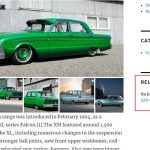Este hilo está resuelto. Aquí tiene una descripción del problema y la solución.
Problem: On a single post, I would like to show a list of related posts from the same post type. Cars are organized using three taxonomies - Make, Model, and Series. I would like to show all the cars in the same Make and Model as the current car.
Solution: For the most flexibility, use a 4th taxonomy "Related Vehicles" and create a term for each car, where the term slug matches the car's post slug. Create a View filtered by Related Vehicle, where the term is set using a shortcode attribute. Use the current post's slug in the shortcode attribute to display a list of posts related to the current post.
For more simplicity, you can use the two taxonomies Make and Model to filter a View of Cars, where the terms are set by the current post. This approach will not allow arbitrary relationships.
This is the technical support forum for Toolset - a suite of plugins for developing WordPress sites without writing PHP.
Everyone can read this forum, but only Toolset clients can post in it. Toolset support works 6 days per week, 19 hours per day.
| Sun | Mon | Tue | Wed | Thu | Fri | Sat |
|---|---|---|---|---|---|---|
| 8:00 – 12:00 | 8:00 – 12:00 | 8:00 – 12:00 | 8:00 – 12:00 | 8:00 – 12:00 | - | - |
| 13:00 – 17:00 | 13:00 – 17:00 | 13:00 – 17:00 | 13:00 – 17:00 | 13:00 – 17:00 | - | - |
Supporter timezone: America/New_York (GMT-04:00)
Este tema contiene 7 respuestas, tiene 2 mensajes.
Última actualización por hace 6 años, 8 meses.
Asistido por: Christian Cox.
